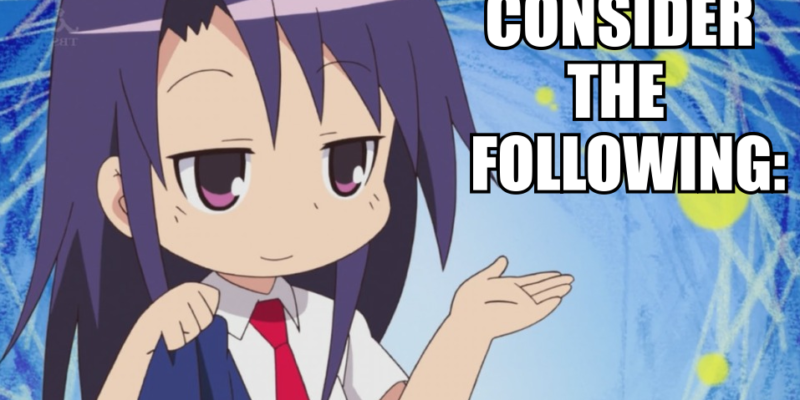The creative writing has definitely been slow going, compared to the traditional work on this site. I’ve found that fiction is far more challenging than non-fiction, in a few different ways. First, I’ve published about 95% of the non-fiction pieces that I’ve started. Generally, even if it’s not the greatest thing ever, a non-fiction work is at least somewhat productive. That’s not the case with fiction, where a story idea, character combination, or whatever, can just not work.
Secondly, the blank page can be quite intimidating. Having no limitations makes things harder, not easier. No matter how many outlines, I can’t really know where I’m going with a story until I sit down to actually pen it. It’s incredibly disappointing putting a ton of effort into something only to realize that the work isn’t any good, which is sort of related to the first problem.
Third, it’s been a struggle to find my voice. I don’t think that I write humourless drama particularly well, and probably never will. Which is fine, it just was a bit of a frustrating process to get to that point.
Finally, I’ve also realized that the “resolution of my imagination,” as John Carmack would say, has been lower than I thought. Many times I’ve imagined a truly lovely paragraph, only to realize when trying to write it down that I didn’t really imagine the paragraph in its entirety, but more the feeling that a well written paragraph would give, with a few lines here and there. This is sort of like thinking you’re imagining a barn, but when you sit down to paint it you realize you only imagined the vague idea of a barn. I didn’t know this could happen in word form, but there it is.
I’ve previously estimated my fiction writing speed at around 250 words/hour before, and I think I need to revise that downwards when it comes to quality I’m comfortable sharing publicly. I do write much faster than that, it’s just not any good until it’s been revised many, many times. After publishing this first piece, I might start publishing the far rougher drafts, just so that there isn’t such a huge gap between articles.
Whatever the case, I’ll at least publish short update articles in the meantime, so I don’t leave you all twisting in the wind. In the meantime, expect the first short story to drop later tonight, or be the scheduled morning piece for tomorrow. I’m quite excited about this one. Thank you for your patience.









Here’s a few things that I’ve found helped my own writing in battling these common issues:
1. “First Drafts Always Suck”: Acknowledge for yourself that at the first pass of writing, it’s going to suck. That’s normal. When a sculptor chisels out a statue from a block, the first order of business is to just get the rough shape, and come in later with different tools and mindset to smooth out the details. Your first draft requires a mindset that carves out from a blank-sheet block some kind of shape that, later in an editing mindset, you can spiff up. De novo writing differs a lot from editing, so give yourself permission that when a paragraph doesn’t come out as inspired as you originally thought that you’ll come back later to revisit. Trust me, your brain continues to work on things like story wording long after you’re away from the sheet, and will yield modifications later if you just let the first draft suck. In the most extreme, you can always toss away a first draft and start over, but in my experience the restart has always been so much better than the first.
2. Non-linear Writing: When a cool phrase or moment reveals itself in your mind, just write down that fragment somewhere on the sheet. Even if you’re working on a different part of the story, just jot it down or even let yourself write that part while the inspiration is flowing there. Then, all you have to do after getting the really cool parts down is simply connect the cool bits later, like mortar between bricks. This not only alleviates the pressure of trying to keep that phrase in your mind, but also can be pretty much undetectable by readers after your editing passes.
3. Checkpoint Breakdowns: Similar to the above, making a roadmap for yourself of the key notes of your story helps let you feel a good sense of progress and when you’re “making it” as it goes. I’ve a tendency to meander in the wrong direction if I don’t make guidelines to follow, and while I’ll inevitably deviate a bit as inspiration strikes these checkpoints help a lot especially when it’s slow-going against the grain.
4. Adopt Personal Methodology: Every author has different quirks and rituals that help get them into a writing mode. Your mileage will vary with any such methods, but you could try adopting a few and seeing how well they work for you. The basics that really help tend to be making a habitual, context-based time for creative writing over repeated actions that define both the start and finish of your writing time. That is, make a ritual to start your writing (brew some coffee, do some exercise, etc), do your writing in the same contextual environment that is unique to it (your writing corner, at a certain time of day, etc), and finish your writing with another ritual. Practice that diligently for a few weeks, and the rituals and contexts themselves will make your brain switch gears into writing mode and make for more successful writing. And once you get that ball rolling, which is rough the first week or two, don’t stop pushing it and it gets easier and easier. That’s where I’ve failed over the years in creative writing.
I’m not sure if you’ll find this helpful as I haven’t watched it all, but it might give you further ideas: https://youtu.be/EkDxsQRbIwo?si=dswrBV9yotX2g77L
Good luck!
This is good stuff man. Especially #1. I would add outlines to that. Outlines always served me well, whenever I had a writing assignment the first thing I would do(being bored and lazy in school) is jot down immediate the inspirations that came to mind when I heard what the assignment was. Definitely a process too, Jung>Freud subconscious mind is definitely a real thing and your brain does do work behind the scenes, thoughts you may only be partially conscious of, so as for writer’s block, paragraphs that just sorta feel off. A good nights sleep is a great thing to get. A fresh perspective can do wonders. Don’t listen to me too much though. Did manage an A in college Eng but my competition was mostly retarded POC. Read their essays (if not been in college peer review is a standard thing) and don’t say this often but… “yikes”. These people are being promoted above us? Western Empire is in it’s dying days brothers. Only thing I am 100% sure of. Everything else seems like I am living in a parody of 1984, BNW, Matrix or The Truman Show.
I agree – this is great fundamental advice. I would add that it helps to know and write toward the ending you have envisioned. Until you have an ending, you don’t have a story.
Here’s a great way to measure whether you have a story or just a poetic narration of un-influential events – at the end of a story – the main character’s life has changed in a way that nothing will ever be the same again.
– note, that “nothing will ever be the same again” is also the yardstick by which you measure a “scene” – a new scene starts every time a different character steps onto the stage or enters the room. If nothing changes – cut it.
Undoubtedly great advice. I’d landed on the “vomit first, clean up later,” approach to writing already. It’s definitely a change from non-fiction though, where the first draft is so far away in quality that it can be kind of discouraging.
My only advice is you just need to practice. Its always a bit awkward; eventually you just figure it out.
Whatever happens, you’re doing this for yourself. Even if your output is a load of horseshit and you end up alienating all of us and your family disowns you, you only have just the one life to try and see what you can make of it.
There will always be people willing to consume your old style of content if you ever choose to go back to it. I suspect the site’s readership is going to fluctuate and change and give a variety of conflicting feedback based on what they want from you. I hope you find the type of reader you wish to write for with your creative work
Thank you. As for the writing, it is indeed a selfish pursuit. I just want to spend a few weeks writing fiction, and am tired of writing about politics that goes nowhere.